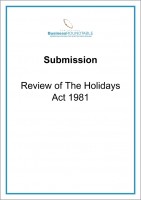
Submission: Review of The Holidays Act 1981
The NZBR welcomes the review of holidays legislation. The current legislation is a source of inconvenience and cost to employers and employees. Read more


The NZBR welcomes the review of holidays legislation. The current legislation is a source of inconvenience and cost to employers and employees. Read more

MINISTERS OF THE CROWN, distinguished guests, ladies and gentlemen. It is my very pleasant duty to welcome you here this evening on behalf of the New Zealand Business Roundtable. Read more
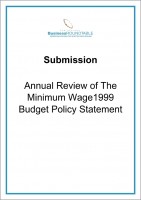
Under Section 5 of the Minimum Wage Act, the Minister of Labour is required to review the minimum wage rate(s) prescribed under the Act each year. This is the NZBR's submission to the 1997 review of the minimum wage. Read more
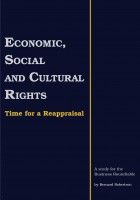
The purpose of this paper is to introduce business people, lawyers and public servants unfamiliar with the international protection of human rights to a potentially important matter which receives little public consideration and on which surprisingly little detailed analysis has been published. The discussion about international protection of human rights tends to be confined to a small group of academics, lawyers and diplomats who have interested themselves in these matters. Read more

The legislation granting the New Zealand Dairy Board the power to control the export of all dairy products gives it the status of an export monopoly. Although the Board is able to grant licences to other exporters, it does not approve applications for licences which it considers to be incompatible with its own strategy. Read more

President Bill Clinton, it is said, can speak for days without inhaling and is capable of holding sincerely, sometimes for minutes on end, exactly the same views as whatever group he is standing in front of. The columnist Dave Barry has even suggested that if Bill is put in front of tress, given enough time, he will engage in photosynthesis. Read more
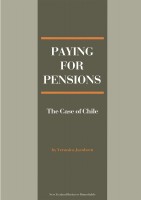
Reform of pension systems has become a serious policy issue in many countries, including New Zealand. The Chilean scheme provided a model for similar reforms of state pensions in countries such as Argentina, Mexico, Bolivia, Colombia and Peru. Read more

The NZBR believes that substantial efficiency gains could be achieved by reforming the management of the roading system. It has therefore strongly supported the work on these issues that has been undertaken by the Ministry of Transport and has had valuable contacts with Transit New Zealand on the subject. Read more
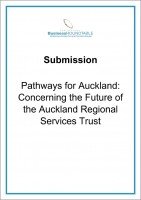
The Auckland Regional Services Trust ('the Trust') was established as a temporary structure and is an anomaly in local government. No comparable structures exist elsewhere in the country. Read more

When David Lange made his famous remark in 1998 about the country needing to stop for a cup of tea and take a break from the task of economic reform, he probably had not idea that his metaphor would enter the national vocabulary in the way it has. The call for a teabreak symbolised the loss of momentum and direction of the latter years of that Labour administration. Read more
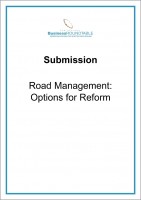
The NZBR welcomes the Ministry of Transport's Discussion Document and the opportunity to comment on regulatory options for road management. The Discussion Document focuses on options for managing road safety, including the appropriate rights of road owners to control access to their assets. Read more
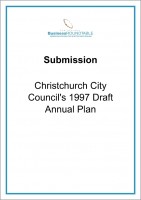
The Plan states the purpose of the Council is to make Christchurch as attractive as possible a city for its citizens in which to live, work and enjoy life. Wide-ranging objectives for the Council are defined to this end. Read more
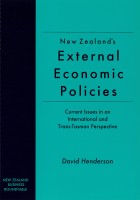
Towards the end of 1996, the trade and foreign investment policies of New Zealand were the subject of a comprehensive assessment within what is now the World Trade Organisation (the WTO). These assessments are in three parts: the government under examination submits a policy statement; the WTO Secretariat prepares a detailed report; and, on the basis of these two documents, in a meeting held at WTO headquarters in Geneva, officials from the Organisation's other member countries make comments of their own, and put questions to the Ambassador of the country concerned. Read more
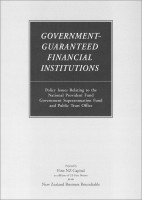
Successive governments have reduced the Crown’s involvement in the provision of financial markets. Notwithstanding the reforms to date, the Crown remains responsible for the operations of the Nations Provident Fund (NPF), the Government Superannuation Fund (GSF) and the Public Trust Office (PTO) and the Public Trust Office (PTO). Read more
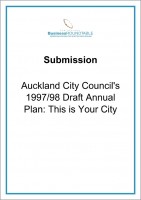
A key weakness in the Plan is the absence of a valid analysis of the proper role of the public sector and, in particular, that of territorial local government. The role of government at any level differs from that of the private sector . Read more